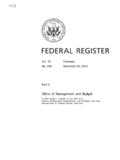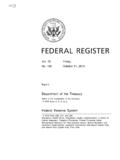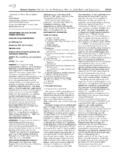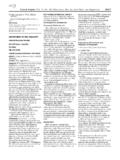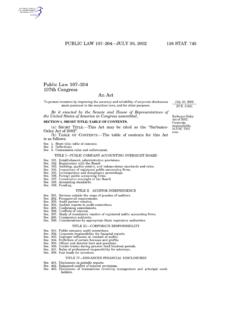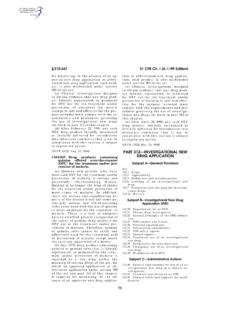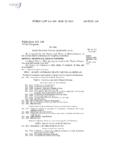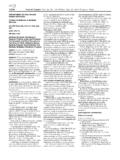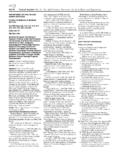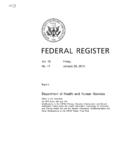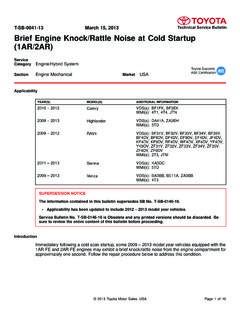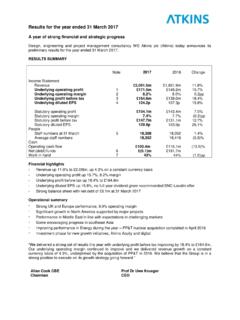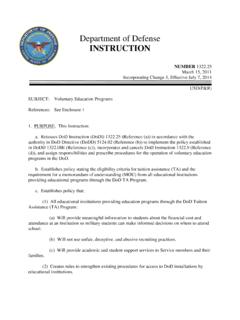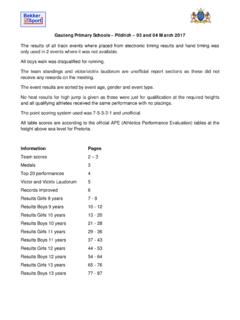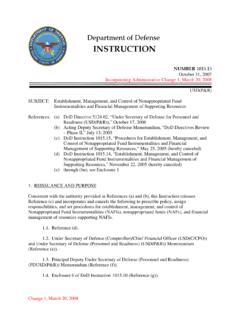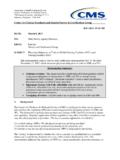Transcription of Federal Register /Vol. 80, No. 49/Friday, March 13, …
1 13253 Federal Register / Vol. 80, No. 49 / Friday, March 13, 2015 / Rules and Regulations official colors of the Seal are Reflex Blue and Gold [Reflex Blue RGB Numbers: 0/ 0/153 (R0, G0, B153); Reflex Gold RGB Numbers: 254/252/1 (R254, G252, B1)]. The Seal may also appear in Reflex Blue or Black. (e) The HHS Departmental symbol, logo, and seal shall each be referred to as an HHS emblem and shall collectively be referred to as HHS emblems. Dated: March 4, 2015. Sylvia M. Burwell, Secretary. [FR Doc. 2015 05536 Filed 3 12 15; 8:45 am] BILLING CODE 4150 04 P DEPARTMENT OF TRANSPORTATION 49 CFR Parts 27 and 37 [Docket OST 2006 23985] RIN 2105 AE15 Transportation for Individuals With Disabilities; Reasonable Modification of Policies and Practices AGENCY: Office of the Secretary (OST), Department of Transportation (DOT).
2 ACTION: Final rule. SUMMARY: The Department is revising its rules under the Americans with Disabilities Act (ADA) and section 504 of the Rehabilitation Act of 1973, as amended (section 504), specifically to provide that transportation entities are required to make reasonable modifications/accommodations to policies, practices, and procedures to avoid discrimination and ensure that their programs are accessible to individuals with disabilities. DATES: This rule is effective July 13, 2015. FOR FURTHER INFORMATION CONTACT: Jill Laptosky, Office of the General Counsel, 1200 New Jersey Avenue SE., Washington, DC 20590, Room W96 488, 202 493 0308, For questions related to transit, you may contact Bonnie Graves, Office of Chief Counsel, Federal Transit Administration, same address, Room E56 306, 202 366 0944, and, for rail, Linda Martin, Office of Chief Counsel, Federal Railroad Administration, same address, Room W31 304, 202 493 6062, SUPPLEMENTARY INFORMATION: This final rule concerning reasonable modification of transportation provider policies and practices is based on a notice of proposed rulemaking (NPRM) issued February 27, 2006 (71 FR 9761).
3 The NPRM also concerned several other subjects, most notably nondiscriminatory access to new and altered rail station platforms. The Department issued a final rule on these other subjects on September 19, 2011 (76 FR 57924). Executive Summary I. Purpose of the Regulatory Action This final rule is needed to clarify that public transportation entities are required to make reasonable modifications/accommodations to their policies, practices, and procedures to ensure program accessibility. While this requirement is not a new obligation for public transportation entities receiving Federal financial assistance (see section 504 of the Rehabilitation Act), including the National Passenger Railroad Corporation (Amtrak), courts have identified an unintended gap in our Americans with Disabilities Act (ADA) regulations.
4 This final rule will fill in the gap. The real-world effect will be that the nature of an individual s disability cannot preclude a public transportation entity from providing full access to the entity s service unless some exception applies. For example, an individual using a wheelchair who needs to access the bus will be able to board the bus even though sidewalk construction or snow prevents the individual from boarding the bus from the bus stop; the operator of the bus will need to slightly adjust the boarding location so that the individual using a wheelchair may board from an accessible location. Reasonable modification/accommodation requirements are a fundamental tenet of disability nondiscrimination law for example, they are an existing requirement for recipients of Federal assistance and are contained in the Department of Justice s (DOJ) ADA rules for public and private entities, the Department of Transportation s (DOT) ADA rules for passenger vessels, and DOT rules under the Air Carrier Access Act.
5 In addition, section 504 has long been interpreted by the courts to require recipients of Federal financial assistance virtually all public transportation entities subject to this final rule to provide reasonable accommodations by making changes to policies, practices, and procedures if needed by an individual with a disability to enable him or her to participate in the recipient s program or activity, unless providing such accommodations are an undue financial and administrative burden or constitute a fundamental alteration of the program or activity. Among the Department s legal authorities to issue this rulemaking are section 504 of the Rehabilitation Act of 1973, as amended (29 794), and the Americans with Disabilities Act (ADA), 42 12101 12213.
6 II. Summary of the Major Provisions of the Regulatory Action Public entities providing designated public transportation ( , fixed route, demand-responsive, and ADA complementary paratransit) service will need to make reasonable modifications/ accommodations to policies and practices to ensure program accessibility subject to several exceptions. These exceptions include when the modification/accommodation would cause a direct threat to the health or safety of others, would result in a fundamental alteration of the service, would not actually be necessary in order for the individual with a disability to access the entity s service, or (for recipients of Federal financial assistance) would result in an undue financial and administrative burden.
7 Appendix E of this final rule provides specific examples of requested modifications that public transportation entities typically would not be required to grant for one or more reasons. Public entities providing designated public transportation service will need to implement their own processes for making decisions and providing reasonable modifications under the ADA to their policies and practices. In many instances, entities already have compliant processes in place. This final rule does not prescribe the exact processes entities must adopt or require DOT approval of the processes. However, DOT reserves the right to review an entity s process as part of its normal oversight.
8 See 49 CFR III. Costs and Benefits The Department estimates that the costs associated with this final rule will be minimal for two reasons. First, modifications to policies, practices, and procedures, if needed by an individual with a disability to enable him or her to participate in a program or activity, are VerDate Sep<11>2014 16:34 Mar 12, 2015 Jkt 235001 PO 00000 Frm 00055 Fmt 4700 Sfmt 4700 E:\FR\FM\ </GPH>tkelley on DSK3 SPTVN1 PROD with RULES13254 Federal Register / Vol. 80, No. 49 / Friday, March 13, 2015 / Rules and Regulations already required by other Federal law that applies to recipients of Federal financial assistance.
9 Since virtually every entity subject to this final rule receives Federal financial assistance, each entity should already be modifying its policies, practices, and procedures when necessary. Second, the reasonable modification/accommodation requirements contained in this final rule are not very different from the origin-to- destination requirement already applicable to complementary paratransit service, as required by current DOT regulations at 49 CFR (a) and as described in its implementing guidance. The Reasonable Modification NPRM Through amendments to the Department s ADA regulations at 49 CFR and , the NPRM proposed that transportation entities, including, but not limited to, public transportation entities required to provide complementary paratransit service, must make reasonable modifications to their policies and practices to avoid discrimination on the basis of disability and ensure program accessibility.
10 Making reasonable modifications to policies and practices is a fundamental tenet of disability nondiscrimination law, reflected in a number of DOT ( , 49 CFR (c)(3), 14 CFR (c)) and DOJ ( , 28 CFR (b)(7)) regulations. Moreover, since at least 1979, section 504 has been interpreted to require recipients of Federal financial assistance to provide reasonable accommodations to program beneficiaries. See, , Alexander v. Choate, 469 287 (1985); Southeastern Community College v. Davis, 442 397 (1979). In accordance with these decisions of the Supreme Court ( , Choate and Davis), the obligation to modify policies, practices, and procedures is a longstanding obligation under section 504, and the Department of Justice, which has coordination authority for section 504 pursuant to Executive Order 12250, is in agreement with this interpretation.
